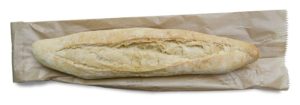Gluten Free
Briefly scanning the isles of any grocery store in America, customers are saturated by hundreds of labels promoting “fat free,” “sugar free,” “organic,” “non-GMO” or “free range” products. Now the term gluten free has made its way onto shelves and is quickly becoming a major dietary trend based on surprisingly little scientific research. While one study shows as many as 18 million Americans have some degree of gluten sensitivity, it is hard to diagnose, and if you aren’t allergic to gluten, removing it from your diet might not be beneficial at all.
What is gluten?
 Doctors define gluten as a protein commonly found in wheat, rye, and barley. Foods containing gluten include bread, beer, pasta, and other highly processed grain based products. Removing gluten from your diet is associated with celiac disease, an intestinal condition characterized by the inability to absorb nutrients from food. Roughly 1% of the American population has been diagnosed however, there are no tests available to determine gluten sensitivity, and many question whether the condition even exists.
Doctors define gluten as a protein commonly found in wheat, rye, and barley. Foods containing gluten include bread, beer, pasta, and other highly processed grain based products. Removing gluten from your diet is associated with celiac disease, an intestinal condition characterized by the inability to absorb nutrients from food. Roughly 1% of the American population has been diagnosed however, there are no tests available to determine gluten sensitivity, and many question whether the condition even exists.
What are Signs of Gluten Intolerance?
Gluten sensitivity can manifest into a multitude of symptoms including diarrhea, abdominal cramping, bloating, headaches, fatigue, and to some degree, attention deficit hyperactivity disorder (ADHD). However, doctors note that these gluten symptoms can be attributed to other ingredients in the food.
Gluten Free Diet Benefits.
This is where the line between medical facts and health diet fads becomes blurred. For those diagnosed with celiac disease, or are highly gluten sensitive, removing gluten from your diet can be tremendously beneficial. For those not experiencing symptoms associated with gluten intolerance, removing it from your diet makes no sense. However, this hasn’t stopped food manufacturers from convincing consumers otherwise, claiming gluten free diet benefits for everyone not just those with celiac disease or sensitivity. But, if you do cut down, not totally eliminate, some foods containing gluten such as bread and carbs, a side benefit may be reduced numbers on the scale and a slimmer waist line. One very real danger of following a gluten-free diet for those undiagnosed is eating too little fiber.
Consult your doctor before treating symptoms of celiac disease or gluten intolerance.




